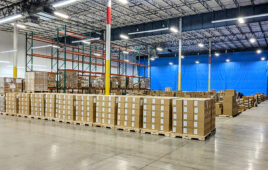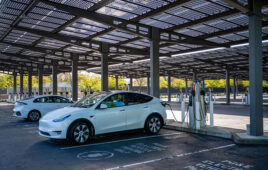As mentioned in my Day 1 roundup, there was plenty to see at RE+, but it was a little difficult to summarize the top themes in the solar panel and energy storage spaces. I talked to many solar panel manufacturers and large-scale energy storage manufacturers on Day 2. For solar panel makers, everyone is switching to TOPCon and guessing at each other’s U.S. manufacturing plans. Long-duration energy storage providers are figuring out domestic content requirements. Here are my Day 2 highlights from RE+ 2023.
Veteran domestic panel manufacturers commit to TOPCon production
Both Silfab Solar and Mission Solar announced new solar panels using TOPCon technology will soon begin rolling off their manufacturing lines in the United States. PERC designs have dominated solar panel models in the last few years, but we’ve reached the limit on gaining any extra efficiency with the “outdated” technology. In just a few extra steps at the cell manufacturing step, TOPCon, or tunnel oxide passivated contact, makes PERC more powerful and efficient. A solar panel manufacturer can fairly quickly adapt its existing manufacturing lines to accommodate the new tech. Many global brands like LONGi and JinkoSolar have been championing TOPCon for the last few years, and now everyone is getting on board.
Silfab, which operates factories in Washington and is starting a new facility in the Southeast, will have American-made TOPCon modules specifically designed for the commercial and residential markets by Q1 next year. The company also intends to make n-type TOPCon cells at its under-construction 1-GW site in the Southeast. Mission Solar, which is expanding its existing module manufacturing facility in Texas, announced two new solar panels using TOPCon technology will be made at the expanded site.
American large-scale ESS makers are scaling production to meet increased demand
My talks with large-scale energy storage manufacturers all eventually led to one point: How domestic is your product? For ESS Inc., it was more easily summed up. As an iron-flow-based long-duration energy storage setup, ESS doesn’t have to worry about where it’s getting its lithium, cells or modules — because there are none. The company is ramping its automated manufacturing line in Oregon to meet the growing demand for its American-based system. ESS doesn’t have concerns about meeting domestic content requirements for the coveted ITC adder.
Powin, also headquartered in Oregon, presents itself as an energy storage platform. It designs everything in the system but the lithium cells. Powin is establishing contract manufacturing relationships throughout the United States (like Jabil in Florida) to make the modules, racks and full systems. Until significant lithium cell manufacturing is established in the United States, Powin will continue to source the product globally. So while securing that domestic content adder is more challenging at the moment for Powin, basically the entire exoskeleton of its large-scale ESS is as American as can be, and it is actively supporting others in their plans to increase domestic lithium cell production.

Big containers of batteries aren’t the easiest things to display on a tradeshow floor, so here is an ESS system in the field.






Tell Us What You Think!